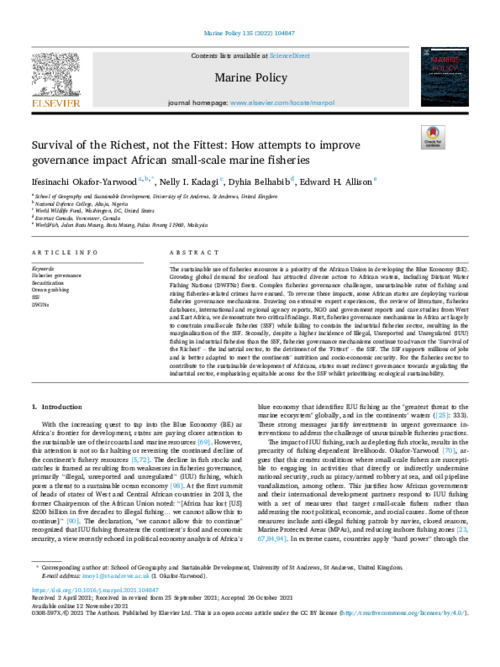Survival of the Richest, not the Fittest: How attempts to improve governance impact African small-scale marine fisheries

The sustainable use of fisheries resources is a priority of the African Union in developing the Blue Economy (BE). Growing global demand for seafood has attracted diverse actors to African waters, including Distant Water Fishing Nations (DWFNs) fleets. Complex fisheries governance challenges, unsustainable rates of fishing and rising fisheries-related crimes have ensued. To reverse these impacts, some African states are deploying various fisheries governance mechanisms. Drawing on extensive expert experiences, the review of literature, fisheries databases, international and regional agency reports, NGO and government reports and case studies from West and East Africa, we demonstrate two critical findings. First, fisheries governance mechanisms in Africa act largely to constrain small-scale fisheries (SSF) while failing to contain the industrial fisheries sector, resulting in the marginalisation of the SSF. Secondly, despite a higher incidence of Illegal, Unreported and Unregulated (IUU) fishing in industrial fisheries than the SSF, fisheries governance mechanisms continue to advance the 'Survival of the Richest' – the industrial sector, to the detriment of the 'Fittest' – the SSF. The SSF supports millions of jobs and is better adapted to meet the continents' nutrition and socio-economic security. For the fisheries sector to contribute to the sustainable development of Africans, states must redirect governance towards regulating the industrial sector, emphasising equitable access for the SSF whilst prioritising ecological sustainability.
Permalink
Date Available
Type
Publisher
ISSN
0308-597X,1872-9460
Copyright
CC-BY-4.0
Research Themes
Topics
Language